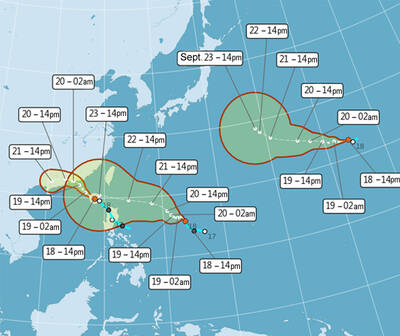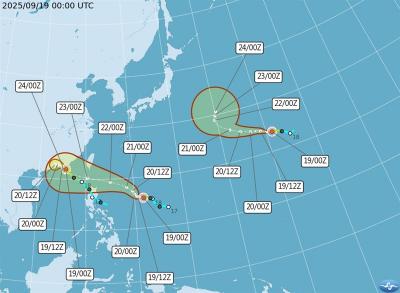More than 1.65 million people in Taiwan used antidepressants in 2022, an increase of about 320,000 compared with five years earlier, while the numbers of young and elderly people using the drugs both increased, the latest data from the Ministry of Health and Welfare showed.
In 2018, about 1.33 million people used antidepressants, the data showed.
Elderly people aged 65 or older accounted for about 519,000 of the antidepressant users in 2022, while about 215,000 people aged 30 or younger used the medications, which exceeded the number of those in the 31-to-40 age group, it showed.

Photo: Liao Hsueh-ju, Taipei Times
In the past few years, young people have been hearing news about depression and suicide, especially those who have just entered university or the labor force, who are seeking independence and developing their self-identities and might feel pressure based on a change in environment or their roles in society, National Taiwan University Hospital Department of Psychiatry attending physician Peng Chi-lun (彭啟倫) said yesterday.
The rising rate of depression among young people is not unique to Taiwan, as the same trend has also been observed in large-scale epidemiological studies by the US and the WHO, especially during the COVID-19 pandemic, Peng said.
Most of the studies show that social media are an important factor as to why the risks of depression or anxiety are higher among people younger than 40 compared with those aged 40 or older, he said.
Young people spend more time on social media, but in the long term, they might develop worries or anxiety that they are missing out on important or interesting events, which is known as fear of missing out, he said.
They might also care greatly about whether people “like” their posts online, or whether someone “followed” them on social media, and they can also experience feelings of exclusion or bullying online, he said.
In August last year, the Department of Mental Health launched a youth mental health support program, offering free counseling to people aged 15 to 30. As of Jan. 16, the service has been used by 18,140 people, for a total of 45,719 counseling sessions.
About 30 percent of those who used the service were referred for further counseling or treatment after a preliminary assessment, effectively screening out high-risk groups and helping prevent conditions from worsening, Mental Health Department Director Chen Liang-yu (陳亮妤) said.
“Many will tell people with depression not to think too much, but that is as ineffective as telling the stomach not to ache when you have a stomachache,” said Yeh Ya-hsin (葉雅馨), director of the John Tung Foundation’s Mental Health Center.
Many young people with depression are wrongly believed to be rebellious, but parents should try to listen and show empathy, while helping them seek professional help when needed, Yeh said.
Under the National Health Insurance (NHI) system, it is relatively easy to receive medication, which might account for the high number of people taking antidepressants, Peng said.
However, antidepressants are not only used to treat depression or anxiety disorders, but also obsessive-compulsive disorders, bulimia, schizophrenia and dementia, he said.
The treatment of depression also includes psychotherapy, repetitive transcranial magnetic stimulation and other non-medication therapies, he added.
A National Health Research Institute study shows that the inclusion of a depression test in government-funded health examinations can improve the chances of high-risk middle-aged or elderly people getting treatment for depression by 65 percent.
However, only about 10 percent of those who showed symptoms of depression actually sought treatment, it said, adding that as Taiwan is expected to become a super-aged society next year, protecting elderly people’s mental health might become an important challenge.
In August 2011, the Health Promotion Administration began including a depression test in the government-funded health examinations for adults. Those aged 40 or older are eligible for the exam once every three years, while those aged 65 or older are eligible once per year.
The depression test includes questions such as “Have you felt depressed, frustrated or hopeless in the past two weeks?” or “Have you lost interest or do you no longer experience the fun in doing things in the past two weeks?” Based on the answers, the administration would refer them to see a physician for a diagnosis.
National Center for Geriatrics and Welfare Research associate researcher and physician Wu Chi-shin’s (吳其炘) research team used the health examination data gathered from 2013 to 2019, along with NHI data, to determine the effectiveness of depression screening.
The team found that among those who took the depression test, on average 1 percent of them were diagnosed with depression each year, compared with 0.6 percent among those who did not take the test, so the chances of receiving treatment for depression increased by 65 percent by taking the test, Wu said.
However, only 10.8 percent of those who showed symptoms of depression based on the test sought medical treatment, he said, adding that the study was published in the journal the Lancet Regional Health–Western Pacific.
Previous studies found that among people with clinical depression, only 27 percent sought medical assistance, meaning that for every patient diagnosed with depression, three to four go undiagnosed, Wu said.
The prevalence of depression among people aged 25 or younger is less than 1 percent, while it is more than 3.7 percent among elderly people aged 65 or older, he said.
Among young people, relationships or work-related problems are common causes of depression, while financial situations and health issues are common among elderly people, he added.
The study was limited by the age eligibility requirement of the government-funded health examination for adults, so the subjects were mainly middle-aged or elderly, he said.
Their research also found that most health examination reports from local clinics focused only on physical illness, which could be because they are unfamiliar with depression treatment, and therefore did not refer cases promptly, he said.
Additionally many elderly people refuse to seek medical attention for mental health, so the rate of the high-risk people who seek treatment remains relatively low, he said.

NEW AGREEMENT: Malaysia approved imports last year after nearly two years of negotiations and inspections to meet quarantine requirements, officials said Up to 3.6 tonnes of pomeloes from Taiwan cleared Malaysian customs on Friday, in the first shipment of Taiwanese pomeloes to Malaysia. Taiwan-grown pomeloes are popular in domestic and overseas markets for their tender and juicy taste, the Ministry of Agriculture’s Animal and Plant Health Inspection Agency said. The fruit is already exported to Japan, Canada, Hong Kong, Singapore and the Philippines, it added. The agency began applying for access to the Malaysian market in 2023, compiling data on climate suitability, pests and diseases, and post-harvest handling, while also engaging in nearly two years of negotiations with Malaysian authorities and submitting supplementary

PEAK MONTHS: Data showed that on average 25 to 27 typhoons formed in the Pacific and South China seas annually, with about four forming per month in July and October One of three tropical depressions in the Pacific strengthened into a typhoon yesterday afternoon, while two others are expected to become typhoons by today, Central Weather Administration (CWA) forecaster Lee Ming-hsiang (李名翔) said yesterday. The outer circulation of Tropical Depression No. 20, now Typhoon Mitag, has brought light rain to Hualien, Taitung and areas in the south, Lee said, adding that as of 2pm yesterday, Mitag was moving west-northwest at 16kph, but is not expected to directly affect Taiwan. It was possible that Tropical Depression No. 21 would become a typhoon as soon as last night, he said. It was moving in a

Tigerair Taiwan and China Airlines (CAL) today announced that several international flights were canceled or rescheduled due to Typhoon Ragasa. The Central Weather Administration (CWA) has maintained sea and land warnings for the typhoon. Its storm circle reached the Hengchun Peninsula (恆春半島) on Taiwan's southern tip at 11am today. Tigerair Taiwan said it canceled Monday's IT551/IT552 Taoyuan-Da Nang, IT606/IT607 Taoyuan-Busan and IT602 Taoyuan-Seoul Incheon flights. Tomorrow, cancelations include IT603 Seoul Incheon-Taoyuan, as well as flights between Taoyuan and Sapporo, Osaka, Tokyo Narita, Okinawa, Fukuoka, Saga, Tokyo Haneda, Nagoya, Asahikawa and Jeju. On Wednesday, the IT321/IT322 Kaohsiung-Macau round-trip would also be canceled. CAL announced that today's

Three tropical depressions yesterday intensified into tropical storms, with one likely to affect Taiwan as a typhoon, the Central Weather Administration (CWA) said. The three storms, named Mitag, Ragasa and Neoguri, were designated as storms No. 17 to 19 for this year, the CWA said. Projected routes indicate that Ragasa is most likely to affect Taiwan, it said. As of 2am today, Ragasa was 1,370km east-southeast of Oluanpi (鵝鑾鼻) on the southernmost tip of Taiwan. It was moving west-northwest before turning northwest, slowing from 11kph to 6kph, the agency said. A sea warning for Ragasa is unlikely before Sunday afternoon, but its outer rim